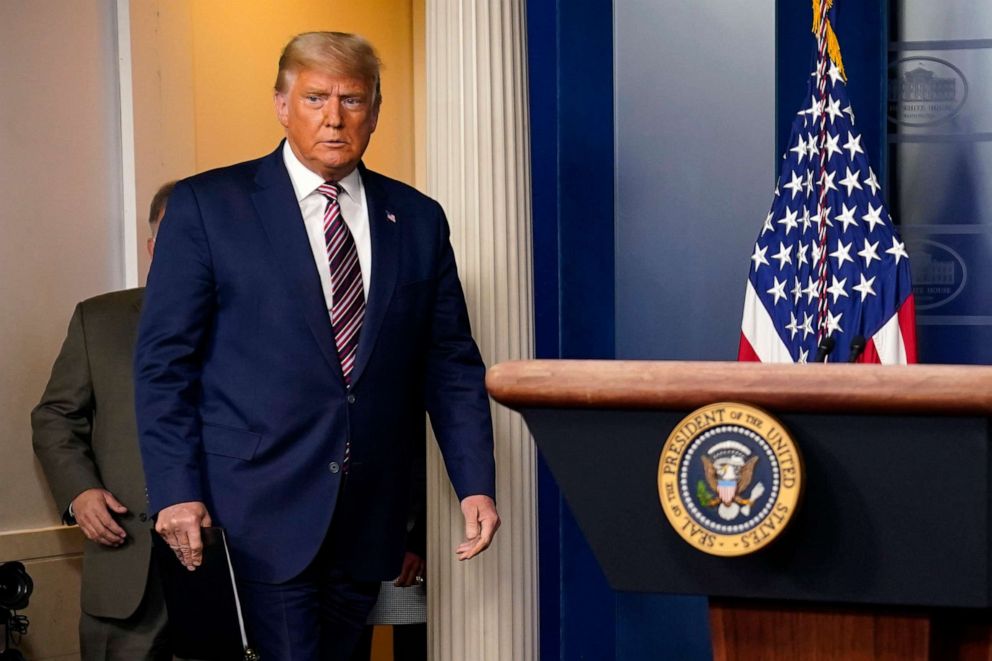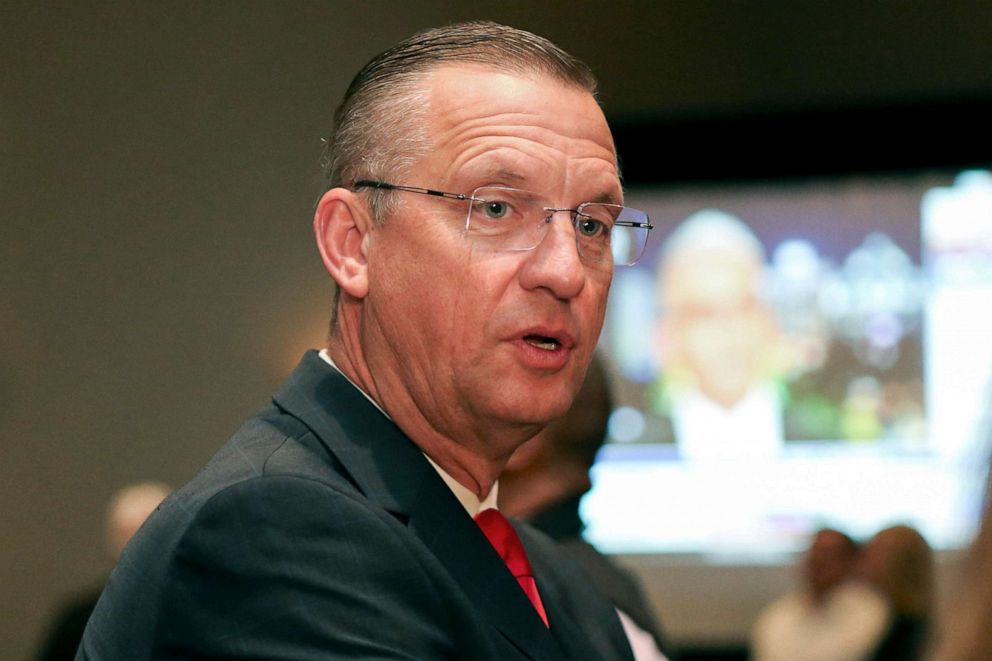Georgia's top election official announces there will be 'full by-hand recount in each county' for presidential race
The Trump campaign requested a hand recount on Tuesday.
Flanked by several elections directors from across Georgia, Secretary of State Brad Raffensperger announced Wednesday that due to how slim the vote margin is between President-elect Joe Biden and President Donald Trump, the state's planned audit will trigger a "full by-hand recount in each county" of the presidential race.
"This will help build confidence. It will be an audit, a recount and a recanvass all at once," Raffensperger, a Republican, said. "It will be a heavy lift, but we will work with the counties to get this done in time for our state certification."
Neither ABC News nor Edison Research has projected a winner in Georgia's presidential contest. Nearly 5 million votes were cast in the presidential race in Georgia. Currently, Biden is leading in the state by about 14,000 votes, which puts him on track to be the first Democrat to win Georgia's electoral votes since 1992. The Trump campaign requested a hand recount on Tuesday.

Raffensperger said he hopes the audit can begin this week, but counties have until Friday to certify their respective results. So far, 98 of Georgia's 159 counties have certified their results. The state's certification deadline is Nov. 20, and Raffensperger said the audit "will take every bit of the time we have left."
Raffensperger said that a candidate would still be entitled to request a recount following certification if the margin between the winning and losing candidate remains within 0.5% of total votes cast. That recount, however, would not be done by hand, pursuant to state law, which requires high-capacity scanners to be used barring a court order or all available scanners failing.
Rep. Doug Collins, who's been tapped to lead the Trump campaign's recount effort in Georgia, called the secretary's move "a victory for transparency."
"This is making sure that every legal vote is counted and every illegal vote is not counted. It allows us to see the integrity of the process. And it allows the people on both sides of this, whether it be President Trump, Joe Biden, or anyone else, to say that the election process has been cleared out in a thorough way," he said on a Trump campaign press call. "It is opening up, also -- it allows us to, again, be looking for the concerns."
Fair Fight, the voting rights organization spearheaded by 2018 Democratic gubernatorial candidate Stacey Abrams, said that Trump is trying to put off "the inevitable."
"Georgia voters decided. Donald Trump cannot overturn the will of Georgia voters. President-Elect Biden won Georgia and won by more than 14,000 votes, more than Trump's win in Michigan in 2016. Donald Trump is delaying the inevitable. He lost, and he knows it," the group tweeted.
A risk-limiting audit was always going to be conducted, but it didn't have to be done for the presidential race, and the audit was not supposed to be a full-hand recount. The risk-limiting audit was supposed to be done by rolling 20, 10-sided dice, which produce random numbers that are input into risk-limiting audit software. A computer would then use those outcomes to tell counties which ballots would be pulled until a specific number of ballots is reached statewide.
The margin in this race, however, is so tight that counting all the ballots will achieve the accuracy needed with the least amount of work.
"When a risk-limiting audit is performed, the number of ballots examined is based on the margin of the contest: a tight margin requires a significantly larger sample size, while a wider margin means fewer ballots can be examined," explained Ben Adida, the executive director for VotingWorks, a nonpartisan nonprofit that has been working with Georgia's secretary of state over the last year to implement the risk-limiting audit.
In a statement, he continued, "In Georgia's case this year, the required sample size is so large -- more than 1.5M ballots -- that it is less work to sample every cast ballot, simply because attempting to audit a large subset incurs the work of retrieving and replacing specific ballots, while reviewing all ballots does not."
Explaining why this audit is being done for this race and in this way, Raffensperger, who is an engineer, cited the race's "national significance," and said that just taking a sampling of ballots would lead to a sacrifice in accuracy because of the close margin.
Raffensperger said that choosing to "follow the science" and consulting with audit experts is what led the state to announce that a full-hand recount would be what's required.
Two people will be looking at the ballots together during the recount audit, Raffensperger said, and he pledged that representatives from both political parties would have access to the process.
"It'll be a methodical process, and it will be an accurate process, and I'm sure that there will be plenty of oversight. We want to make sure that both parties have the opportunity to observe this, because we understand the stakes are high," he said.
In a follow-up interview with ABC News' "Start Here" podcast, Raffensperger told host Brad Mielke that officials won't be arguing over ovals or X's while examining all the ballots. What the counters see is a computer printout that clearly says the voter's candidate choice.
"So it's very obvious," Raffensperger said. "That's the new system we put into place this year."
Mielke also asked whether doing this count by hand would be less accurate than what a machine could do.
"The least reliable parts of all these processes is people. ... We will all make mistakes, and I guarantee you if I get a deck of 1,000 votes, and I give it to people to count, it will come up with different thing every time. If I give it to a computer to count, 99% of time, it's gonna come up with the same outcome," Gabriel Sterling, the statewide voting systems implementation manager, said in a press conference Monday.
But Raffensperger argued that because it's only an audit of one race, human error isn't as big of an issue.
"That would be true, if you were looking at all the different races," he said. "It really helps eliminate any human error that you could have."
Raffensperger's press conference came following days of Georgia Republicans attacking a member of their own party. The state's two Republican senators called on Raffensperger to resign, and the Trump campaign and state Republican Party requested the secretary order a manual, statewide recount, baselessly claiming they had reports of "tens of thousands of ballots being unlawfully counted."

In a letter to the secretary sent Tuesday, Georgia Republican Party Chairman David Shafer and Collins called on him to conduct this recount, saying they wanted it done before the results are certified.
Their letter called for the recount to be conducted for the presidential race, the Senate race between Sen. David Perdue and Democrat Jon Ossoff and the first district race for the Georgia Public Service Commission.
Only the presidential race is being audited by a full-hand recount, according to Raffensperger.
The letter stated that the signatories were providing "affidavits" to Raffensperger's office about election issues, like ineligible voters casting ballots -- including dead voters -- and absentee ballots being counted without proper signature verification. A footnote of the letter states that the "affidavits are a sample of the evidence that has been collected." None of the affidavits backing up their claims were shared along with the letter.
Excluding retiring Rep. Rob Woodall, and Collins, who represents the 9th Congressional District until his term ends in January, every Republican member and member-elect for Georgia's delegation to the House of Representatives signed a follow-up letter to Raffensperger, urging the secretary to "fully examine and grant the requests laid out in" the letter from Collins and Shafer.
Raffensperger's office, and Raffensperger himself, have repeatedly said they haven't found credible evidence of any widespread irregularities with the election yet, even while admitting that there is going to be evidence that "illegal voting" took place.
"Was there illegal voting? I am sure there was. And my office is investigating all of it. Does it rise to the numbers or margin necessary to change the outcome to where President Trump is given Georgia's electoral votes? That is unlikely," Raffensperger said in a statement responding to Loeffler and Perdue Monday.
During Wednesday's press conference, the secretary again said that his office will investigate any allegation raised regarding election irregularities.
"We've been open and transparent. ... If you have any information about illegal voting, or voter fraud, bring that to our attention, and we will investigate every case that we hear," he said.
But, he also added that "anecdotes and stories (don't) work."
ABC News's Will Steakin, Olivia Rubin, Justin Gomez and Terrance Smith contributed reporting.
This report was featured in the Thursday, Nov. 12, 2020, episode of “Start Here,” ABC News’ daily news podcast.
"Start Here" offers a straightforward look at the day's top stories in 20 minutes. Listen for free every weekday on Apple Podcasts, Google Podcasts, Spotify, the ABC News app or wherever you get your podcasts.




